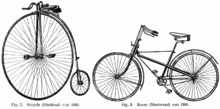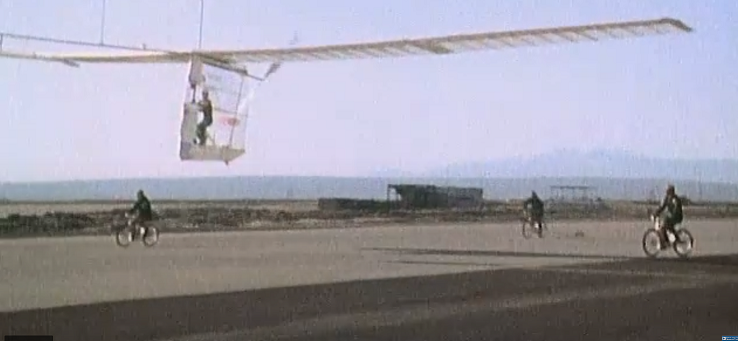Ladies and gentlemen, fasten your seatbelts. No!
Well then, don your bicycle helmet. No! Drivers actually pay less attention to you if they see a helmet, figuring they're not likely to kill a smarty-pants, and are less careful around you (2x as likely to pass close). A toque or baseball cap in case of rain is more practical.
Just check your tires, wake your trusty wings up and take off.
NO drugs or alcohol. You need much more focus than driving modern computerized cars. Besides, the high is natural. 68% of cyclists experience joy as they ride vs drivers (50%) and public transitters (20%).
NO car and bike rack. Okay, I'll sponge off a driver in extremis, given our scandalous Via Rail which long ago dispensed with bike transport, making our newly minted rail trails mostly inaccessible except by you-know-what.
NO earphones. Listen to nature-man's music. It's all music of the spheres. And much safer.
Eyes pealed. Many a find – belt, elastic cord, lunch (!), apples, pears, berries, birds and more birds. Birds immediately take note and often swoop down, strutting their superior navigation skills, curious about this lumbering, low flying something, accompanying you through their territory.
Getting out of Toronto is the unpleasant part. City traffic is lethal. Angry, impatient pit bulls crowded together, our cowardly politicians pandering to them. I love zipping past, weaving between them, but I'm always reminded of how easily I can become roadkill. I try to limit my Toronto cycling to off hours (early morning, Sundays for a bit of urban exploring). We humans have novelty baked in our genes. The hunger-gatherer in us makes us restless.
Biking back through Ryerson (Metropolitan University) on my way back from the food bank is like a choreographed mass dance, weaving among hundreds of individuals, groups, tables. Sometimes I have to pause to avoid hitting someone, but it's fun, and like a cat always landing on its feet, I've never hit or inconvenienced anyone. I'm treated like God's little sparrow under foot, darting to avoid the crush, then right onto Yonge and a beeline across to Elm, missing a massive snarling truck, a taxi and various pedestrians, as if we are in two different worlds, with the hundreds of passer-bys, driver-bys, oblivious to me, as I very intently avoid them all. Another week, another victory, better than any video game.

I cross Yonge and slip through the traffic posts on the left into the pedestrian tunnel on the left
At Elm street, I transform into a pigeon for the long straight stretch. The Flying Pigeon (pinyin: fēigē) is still a publicly owned bicycle company based in Tianjin. In production since 1950, the Pigeon's very Chinese name was a call for peace during the war in Korea. More than 500 million Flying Pigeon PA-02 bicycles have been made, more than any other model of any vehicle. Thank you, Mao! Deng Xiaoping defined prosperity as 'a Flying Pigeon in every household,' though his 'capitalist road' largely abandoned the bike, following America's disastrous path. The sturdy Pigeon long ago sated China's market and, unchanged, needs only spare parts these days, waiting for the Chinese to get through their teen years of growth and expansion and return to adult winged transport.
Europeans have sensibly maintained their adult bikes and now lead the way in putting bicycles at the center of our coming postcapitalist New World Order. Marx seems to be right – that we all have to go through this troublesome teen growth stage, adopting nasty capitalism, producing urban jungles and sprawl, bringing death and destruction, before maturing, waking up to a more natural way of living.
Each trip is different, even if you don't vary the route. Better yet, you can always ramp up the risk factor, so novelty is not a problem. Good for me mentally and physically, and good for all the rest of organic and inorganic nature. Just a wee bit of CO2 and heat pollution. My weekly ritual, thumbing my nose at clunky cars and plodding pedestrians.
Bike History
Is the lowly bike a silver bullet to solve our many crises – unlivable cities, urban sprawl, famine, global warming? Only as part of a wider transformation of our urban culture. In the 1970s, Portland established a greenbelt to stop sprawl, tore down its worst freeway, build light rail, streetcars, bicycle lanes. Traffic fatalities fell 80% by 2008. Portlanders save $1.1b gas a year on gas alone. Less money stolen by distant oil barons, car companies, more for food, fun, keeping local money in circulation for Portlanders. Slow-moving streetcars brought $3.5b in development.
Apart from political will, the transformation requires making real physical exercise part of your daily routine, which is very good in any case. Sitting, whether at home or in your car, helps no one. Don't even mention the ebike, a bane to one and all, pretending it's a bike so as to terrorize real cyclists, delivering junk food to junk people with too much money. And NOT the escooter, a fragile thing punching dangerously above its weight.
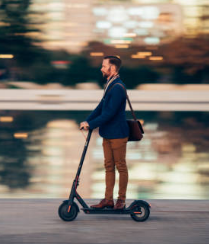
Check out Youtube for disaster videos involving them.
The first bicycle, invented in 1817 by Karl Drais, was more like a recumbent skateboard, sans pedals and gears, the Laufmaschine (running machine), which the English called the dandy horse and the French velocipede. Notice the date 1817, and that I didn't include war in the crises we can solve. As usual with technology, the bicycle was invented as a result of war.* After the eruption of Mount Tambora (Indonesia) and the Year without a Summer (1816), which followed close on the devastation of the Napoleonic Wars, widespread crop failures and food shortages resulted in the deaths of tens of thousands of horses.
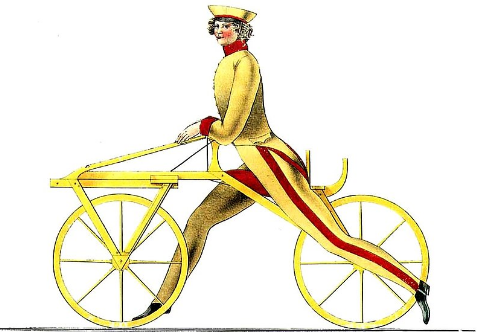
Laufmaschine dandy horse velocipede
In New York City, a law was passed that banned dandy horses from all footpaths and public places, as they were big, heavy, not to mention ugly.
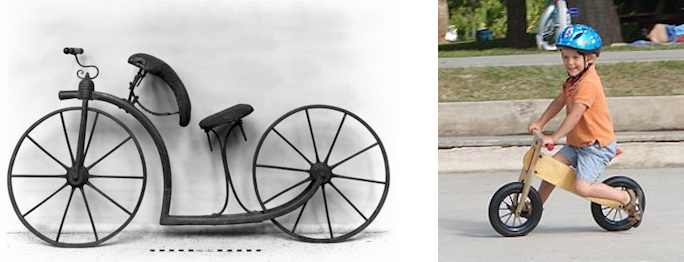
Last surviving dandy horse. Small is beautiful.
The French added an adjustable seat and pedals to the front wheel, creating the velocide in 1860s, the penny farthing (big little wheels), elegant but ungainly, uncomfortable (nicknamed 'boneshaker') and dangerous to all (no brakes!).
The 19th c was spectacular, capitalism full of vigor and innovation, and it took on the challenge of the laufmaschine. In 1885 John Kemp Starley came out with the first commercially successful 'safety bicycle' he named the Rover, with steering and your feet near the ground to act as brakes. (Rover switched to cars in 1925 though its name lives on in Polish 'rower' and Belarussian 'rovar'.) It became the bicycle of today by adding ball bearings, the diamond-shaped frame, first rubber tires then tube tires by 1890, and finally by 1910 the French derailleur (derailer).
Viola, the perfect machine.
The bicycle was a machine waiting to be invented. I would suggest that it was the greatest achievement of capitalism, the closest to a perfect machine, good for everyone, safe, nonpolluting. Its speed is that of a bird, the perfect speed for living creatures. It is cheap and easy to produce and can't be improved on. By the early 21st century there were more than 1 billion bicycles. There are many more bicycles than cars, though too many sit unused, despised by the rich, while being the principal means of transport for the poor in many parts of the world. But capitalism never rests and went on to give us the horrors of motorized transport at insane, unnatural speeds.
Spirited, upper-middle class western women embraced the bicycle as a new source of personal freedom.
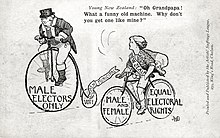
Opposition to cycling in the Ottoman Empire was quick from conservatives and religious fundamentalists, who criticized bicycles as the Devil's Chariot. Orthodox scholars claimed that cycling would harm reproductive organs, embolden sexual permissiveness and lead to the destruction of the family. Women's cycling was bid’ah . i.e., an innovation which should be okayed first by a sheikh, not just thoughtlessly introduced. In the early 20th century, women in the Ottoman Empire nevertheless went on to adopt cycling for varied purposes with a new sense of freedom. Women are still not allowed to ride bikes in public in either Saudi Arabia or Iran.
Bicycles quickly spread around the rest of the world alongside the British Empire. In terms of the bicycle as workhorse, rickshaw taxis and cargo bikes were a great boon for the poor and have never gone out of fashion. Cycling steadily became more important in Europe over the first half of the twentieth century, but it was killed in the (huge, now empty) US by 1910 with the advent of the car. By the 1920s, bicycles had become children's toys. Only since 2012 has commuter cycling increased in Britain, partly due to the 2005 metro bombing, which prompted many to turn to the bicycle as less dangerous, still a questionable assumption. The BBC even mocked at the 'new golf' for executive wheeling-dealing.
The only drawback healthwise is that replacing walking with cycling means your bone structure doesn't get any exercise. Much like astronauts, bone density of cycle fanatics is up to 20% less than noncyclists. So walking up the hills is actually a necessity for overall health.
We were born to move, not to be transported. And that means walking even more than biking. In a controlled experiment with daily walking 5 miles a day, those who walked even more were the healthiest and happiest. It's not just healthier but happier, boosts your self esteem, food tastes better, oxytocin, etc.
Bicycling is 4x faster than walking, using 1/4 energy, giving you 16x the range of a walker. The cyclist is the most efficient traveler among all machines and animals of all times. And the most aesthetic. You feel connected to the world around you in a way that's not possible in the sealed environment of big, clunky metal boxes, be they cars, buses or metros. The journey is both sensual and kinesthetic. A survey in the Netherlands in 2007 showed
*experience of joy traveling by bike 68% by car 50% by bus 20% ,
*experience of fear travelling by bike 5% by car 8% by bus 10%.
Forget about Kamal Harris's 'joy'. If you want joy, hop on your bike. It and walking as our principle transport is the best possible solution to the crisis of too many carbon hungry humans' urban nonlinear complex chaotic reality. And both the Soviet Union and China eventually dumped it in the interest of whom? What? The spirit of capitalism is pulling the strings, making fools of us. It gave us the silver bullet and then tarnished it. Only 1 in 100 in the US bikes to work or school. Many suburbs have no sidewalks let alone bike lanes. ARGH!
Urban angst
In our Age of Separation, the isolated profit-maximizing individual is a hollow, simplistic way of thinking about life. Life in the machine world constantly telling us to work more, buy more. We have junk values. Even when you try to extricate that self from the hurricane, you are still in the middle of a hurricane (driving your car, driving the infernal system).
Forgive me for soapboxing, but when I think of the reality I'm living in, I am constantly amazed at how capitalism, the spirit of capitalism, is truly satanic. It inverts man's character (good becomes bad, real unreal, creates slavery, war, jingoism, etc) and destroys nature. Everyone is afflicted. Urban bus drivers get sick more, die younger.
For a brief moment, there was a kind of middle ground – urban pockets in the countryside with amenities (store, school, clinic), and the greater city nearby for work. But that was the 1880s--1920s streetcar era, with efficient public transit, bringing the commute time down to 15-30 minutes, which is what the human animal can comfortably manage. Since then we have invested in a system that makes people sick, fat and isolated, angry and stressed.
The obvious solution to congestion is, of course, building more roads. lol. We're still doing that in Toronto in 2024, with road builders slavering at the mouth as the government fights anti-expresswayers trying to stop the latest new ribbon of death.
After a century of this, the damage to the entire country/ world has been done, with urban sprawl covering, choking, precious soil with poisonous asphalt. As for us humans, if your spouse commutes longer than 45 minutes, you are 40% more likely to get divorced. And that commute means soulless suburbs, children withdrawn and into drugs, etc. Satan himself couldn't have done a better job.
Bogota is legendary with its string of visionary pro-bike mayors in the 1990s-2000, as Charles Montgomery describes in Happy City (2013), combining bike lanes, car-free Sundays, designated bus lanes and express buses, lots of parks to encourage walking and cycling. The long term impact of more biking is less traffic congestion. Commute times are less, air better, fewer deaths, even murders. The city had a renaissance, even with civil war raging and right wing presidents. There was a new positive optimism and civic pride. Their 'silver bullet' was holistic, with the bike the key.
Your means of transport is central to who you are and what kind of society, world you inhabit. Like Marx, I'm keen to take from the cesspool of capitalism the best achievements as part of a post-commodity world, where you grow your own food, keep your heirloom bike in good repair, make your own music, etc, all the time cooperating in a village setting. The bike (and walking) is the 'way' to get to Marx's 'withering away' of the state and an end to our commodification. It's a pipe dream now, but it could happen if we take hold of our collective crises.
Think Dao. The way is the goal, the goal the way. Your transport is a metaphor for your life journey. Your journey is ultimate one, not just of transport, but of transcendence. Bike there.
---
*Bicycles were used by paratroopers during the war to help them with transportation, nicknamed 'bomber bikes'.
